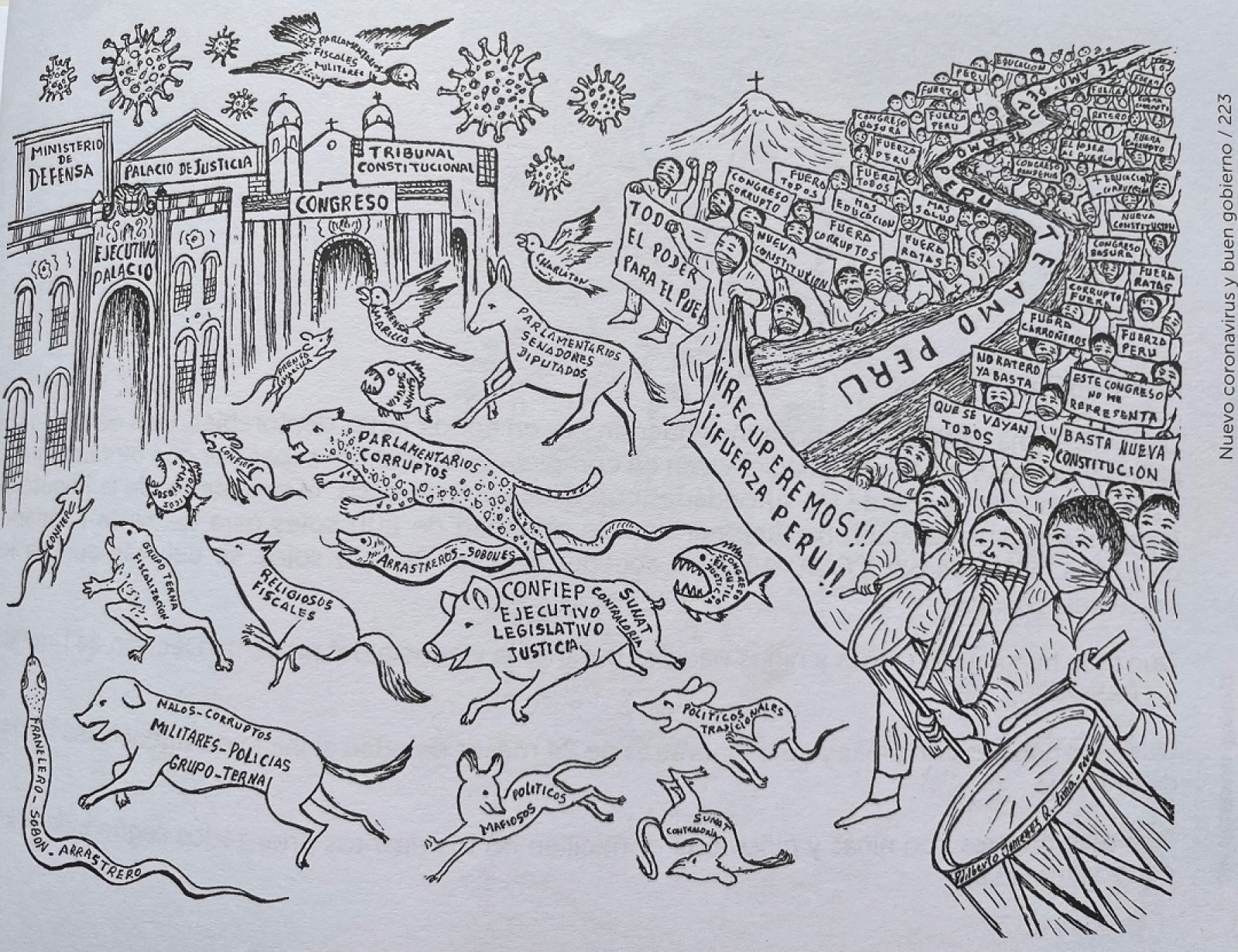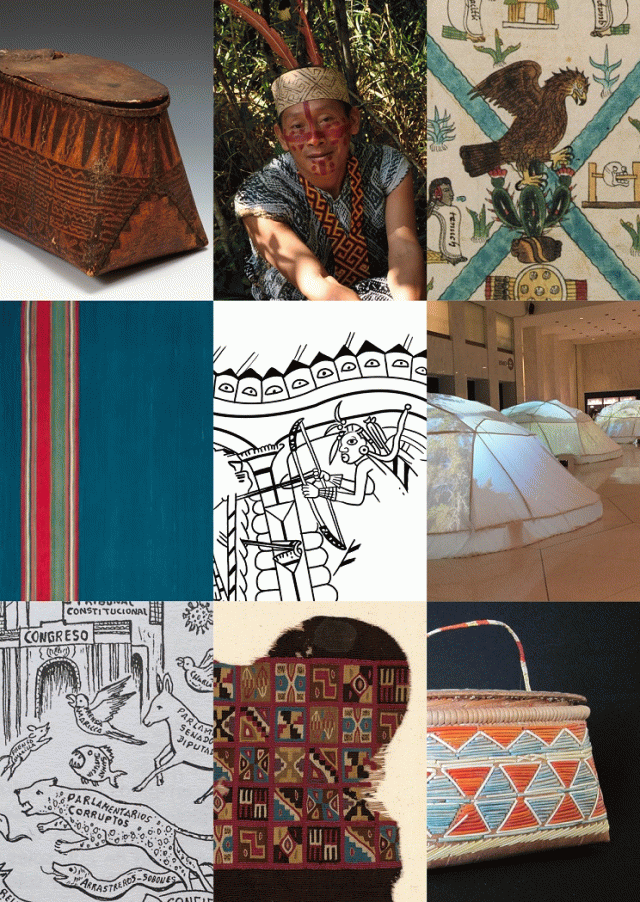Vortragsreihe
María Eugenia Ulfe:
Representing the Incommensurable, Recreating the Inconceivable: The Case of Andean Artists and Their Contemporary Artwork
Within the framework of the KHI Amerindian Lecture Series

Edilberto Jiménez, Nuevo coronavirus y buen gobierno. Memorias de la pandemia de COVID-19 en Perú. Lima: Instituto de Estudios Peruanos, 2021, p. 223
Andean retablos come from painted wooden boxes on which artists used to depict images of the ritual branding of animals and their patron saints. Usually, these wooden boxes have two floors or levels: the first one allocates the saints, and the second is for human celebration of animals’ branding ritual. Retablos and other Andean arts, such as painted tablas and songs, have been used for the transmission and depiction of memories related to the period of the internal armed conflict in Peru between 1980 and 2000. The possibility of doing hand-made images with flour, chalk and glue allows artists to create complex, more vivid scenes, and also to incorporate a (political) opinion in their artwork. Typically, these pieces were linked to what they experienced in their daily lives.
In this lecture, I argue that ‘quasi-events’ (in Povinelli’s terms) help artists to pick up what is relevant from common lives, what is immeasurable, sensible and inconceivable, and what makes these experiences concrete in visual narratives depicted on retablos and other artforms. Retablos have evolved and more recently these artworks incorporate the pain and sorrow left by COVID-19, as well as current political manifestations in Peru. From depicting memory and violence to recreating the pandemic, artists not only recreate memory but also contribute to construction of historical accounts in our contemporary lives.
María Eugenia Ulfe is a Peruvian anthropologist, full professor and researcher in the Department of Social Sciences at Pontifical Catholic University of Peru (PUCP). She received her MA in the Arts of the Americas, Oceania, and Africa at the University of East Anglia (1995). She holds a PhD in Human Sciences/Anthropology at the George Washington University (2005), and she is an Honorary Professor at the Universidad Nacional de San Cristóbal de Huamanga. She directs the Interdisciplinary Research Group Memory and Democracy at PUCP. For the second year, Ulfe continues to be the director of the Latin American Studies Association (LASA) Film Festival. Her research interests include Anthropology of the State, politics, and arts focused on memory, gender, ethnicity, and violence, as well as experimental visual ethnography.
Among her publications are: Danzando en Ayacucho. Música y ritual desde el Rincón de los Muertos [Dancing in Ayacucho. Music and ritual from the Rincón de los Muertos] (PUCP, 2004); Cajones de la memoria: la historia reciente del Perú en los retablos andinos [Drawers of memory: Peru’s recent history in Andean retablos] (PUCP, 2011); ¿Y después de la violencia que queda? Víctimas, ciudadanos y reparaciones en el contexto post-CVR en el Perú [What is left after the violence? Victims, citizens and reparations in the post-CVR context in Peru] (CLACSO, 2013); En busca de reconocimiento. Reflexiones desde un Perú diverso [In search of recognition. Reflections from a diverse Peru] (PUCP, 2017); with Maritza Paredes, Eduardo Dargent and José Carlos Orihuela, Ulfe edited the book Resource Booms and Institutional Pathways: The Case of Peru (Palgrave, 2017).
The KHI Amerindian Lecture Series 2021 is conceived as a forum to reflect on Indigenous arts/visual cultures and aesthetic practices created on the American continent, past and present. It is organized by Sanja Savkić Šebek (KHI in Florenz – Max-Planck-Institut & Humboldt-Universität zu Berlin) & Bat-ami Artzi (Dumbarton Oaks) within the framework of the Department Gerhard Wolf & the 4A Laboratory: Art Histories, Archaeologies, Anthropologies, Aesthetics.
25. November 2021, 17:30 Uhr
The event takes place online.
To participate please register in advance via Zoom:
https://zoom.us/meeting/register/tJYvcuurpjoqHdXuTwDzBrciyI2kHzavj-g1
After registering, you will receive a confirmation email containing information about joining the meeting.
Hinweis
Diese Veranstaltung wird durch Fotografien und/oder Videoaufnahmen dokumentiert. Falls es nicht Ihre Zustimmung findet, dass das Kunsthistorische Institut in Florenz Aufnahmen, auf denen Sie erkennbar abgebildet sein könnten, für die Veranstaltungsdokumentation und Öffentlichkeitsarbeit (z.B. Social Media) verwendet, bitten wir um eine entsprechende Rückmeldung.



